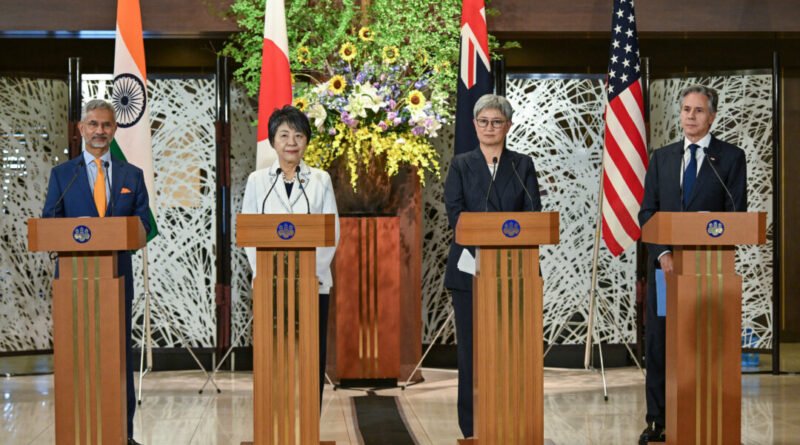Blinken and Foreign Ministers Expressing Serious Concerns Regarding Indo-Pacific Security
‘No country dominates and no country is dominated’ in the Indo-Pacific, the Quad partners said.
U.S. Secretary of State Antony Blinken and top diplomats from Australia, India, and Japan expressed their serious concerns about the situation in the South and East China Seas. They are working on ways to maintain maritime safety and security in the region.
Mr. Blinken, Japanese Foreign Minister Yoko Kamikawa, Australian Foreign Minister Penny Wong, and Indian External Affairs Minister Subrahmanyam Jaishankar met in Tokyo on July 29 for a ministerial meeting of the Quad (Quadrilateral Security Dialogue) partners.
In a joint statement following their meeting, the four diplomats expressed their concerns about recent Chinese maritime activities without directly mentioning China.
“We are seriously concerned about the situation in the East and South China Seas and reiterate our strong opposition to any unilateral actions that seek to change the status quo by force or coercion,” the foreign ministers stated.
“We continue to express our serious concern about the militarization of disputed features, coercive and intimidating maneuvers in the South China Sea, and the dangerous use of coast guard and maritime militia vessels,” they added.
The Quad partners are working on initiatives to maintain “the free and open maritime order,” including enhancing maritime domain awareness through satellite data, training, and capacity building. They announced a plan to launch “a Quad maritime legal dialogue” to support efforts to “uphold the rules-based maritime order in the Indo-Pacific.”
‘Free, Open Indo-Pacific’
“We are working towards a more secure and open Indo-Pacific and Indian Ocean region through enhanced maritime security,” Mr. Blinken told reporters. “What does this mean practically? It involves strengthening the capacity of partners in the region to monitor activities within their waters.”
He reiterated the United States’ commitment to ensuring freedom of navigation, overflight, and lawful maritime commerce.
Mr. Jaishankar emphasized that the Quad partners are united in their pursuit of a free and open Indo-Pacific, a rules-based order, and global good.
Chinese foreign ministry spokesperson Lin Jian accused the Quad of “artificially creating tension” and “inciting confrontation” in the South and East China Seas during a regular briefing on July 29.
Mr. Blinken and U.S. Secretary of Defense Lloyd Austin also met with Japanese Prime Minister Kishida Fumio in Tokyo. The three officials discussed expanding trilateral cooperation with South Korea.
The officials also stressed the importance of peace in the Taiwan Strait for global security and prosperity.
Taiwan welcomed the support from Japan and the United States in safeguarding shared values of freedom, democracy, and the rule of law in the Indo-Pacific region.
Reuters contributed to this report.






